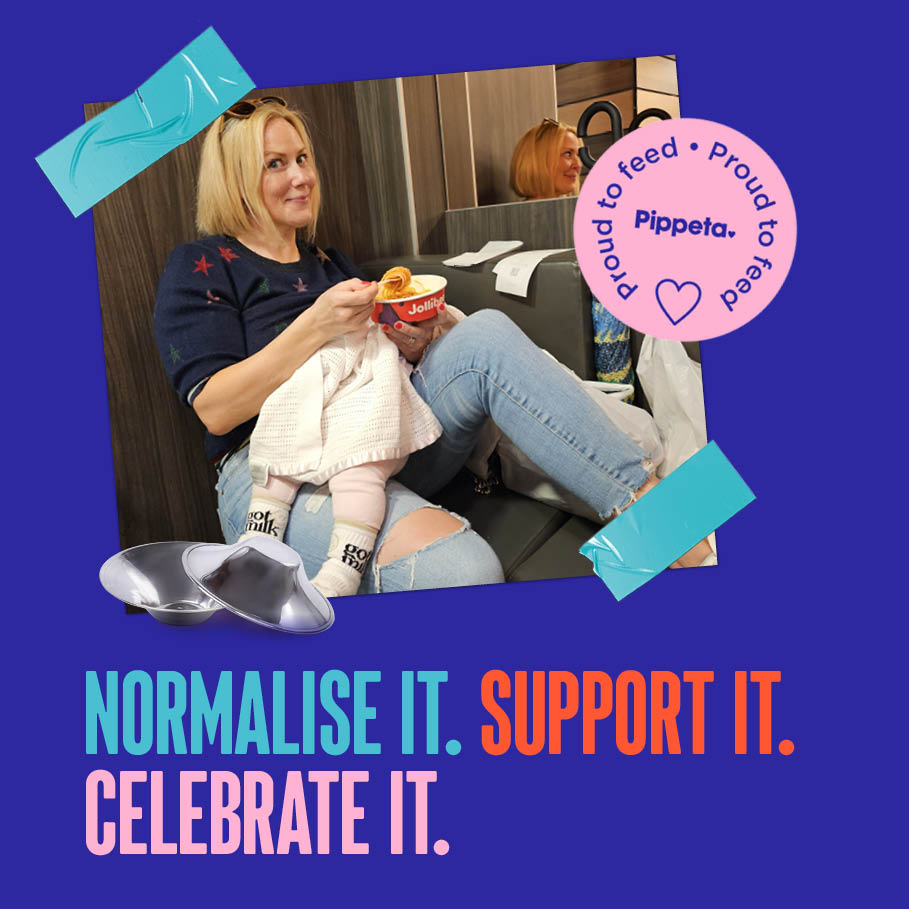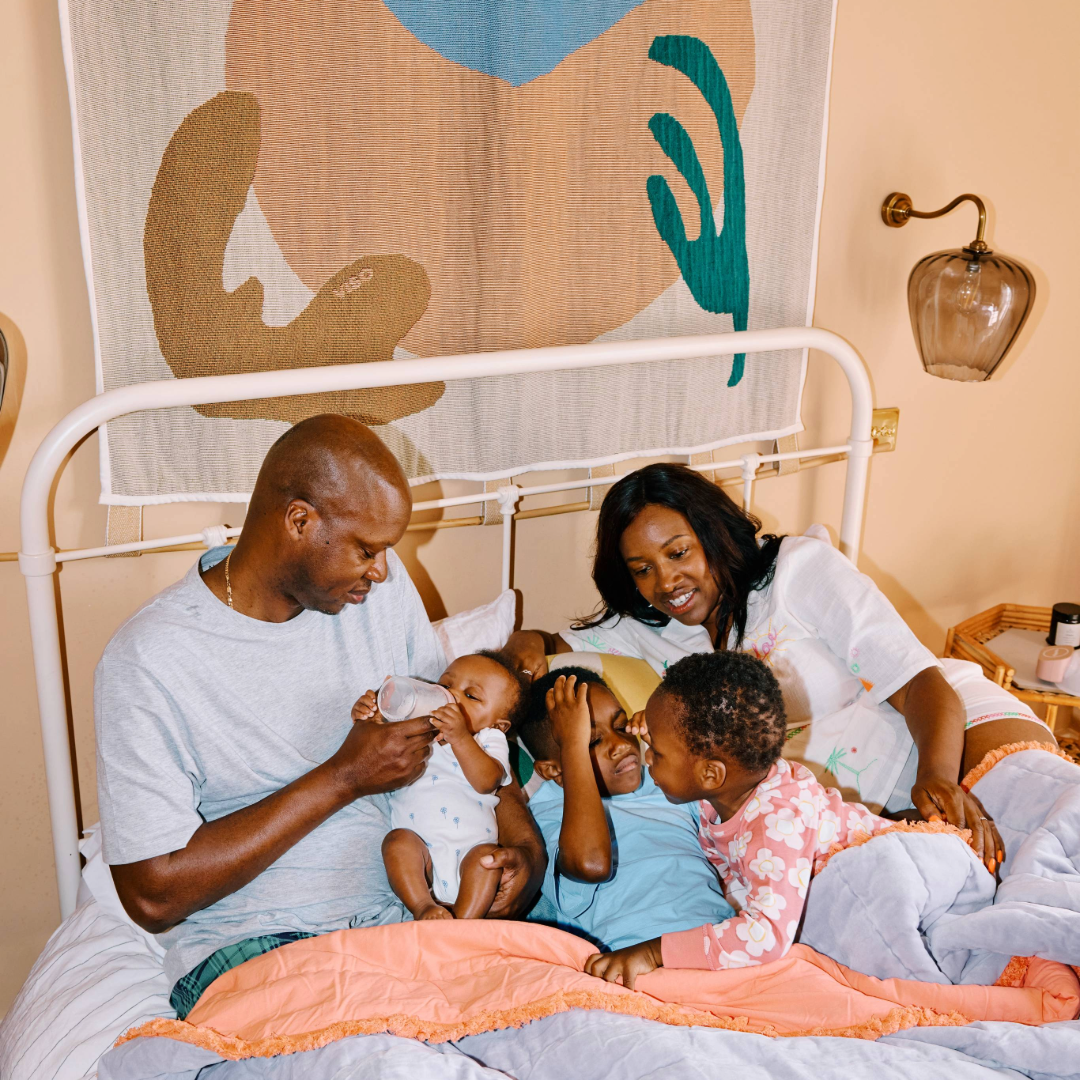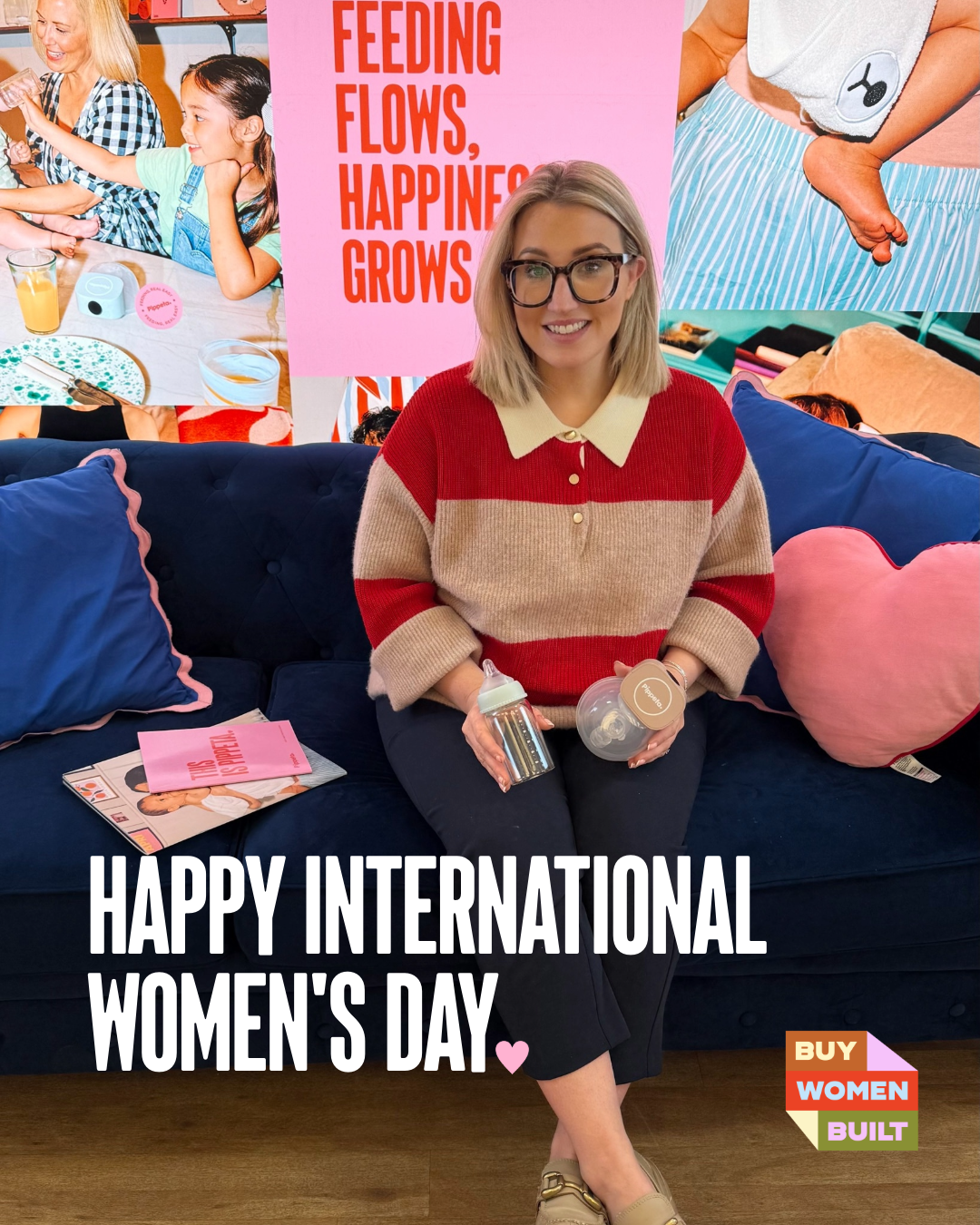Breastfeeding is a natural and essential part of being a mum, yet for many women, feeding their baby in public can be a source of anxiety, hesitation, or even a negative experience. At Pippeta, we believe in empowering parents and breaking down barriers that make breastfeeding more difficult than it needs to be. Saturday the 22nd February is World breastfeeding in public day so to better understand the reality of breastfeeding in public, we surveyed 55 women from our very own Pippeta Mum Community.
Their voices tell a story of progress, but also highlight the challenges that remain. This blog presents some of the key insights from the survey, sheds light on the barriers still faced by UK mums, and outlines steps that can be taken to create a more supportive and inclusive society.
Who Took Part? (Survey Demographics)
Our survey captured a diverse range of breastfeeding experiences from mums across the UK:
Age Range: The majority of mums were aged 25-34 (58%), followed by 35-44 (36%), with a smaller percentage (5%) aged 18-24.
Children’s Age: Responses covered babies from newborn to toddler age, ensuring a wide representation of breastfeeding stages.
This mix of experiences provides valuable insight into how different mums navigate breastfeeding in public and how attitudes have changed over time.
How Comfortable Are Pippeta Mums Breastfeeding in Public?
The survey revealed that while many mums feel comfortable, a significant portion still experience discomfort when breastfeeding outside the home:
81% feel comfortable breastfeeding in public (37% very comfortable, 44% somewhat comfortable).
15% feel uncomfortable (13% somewhat uncomfortable, 2% very uncomfortable).
4% were unsure about how they felt.
Why does this matter?
While it's encouraging that the majority of mums feel confident, the fact that nearly 1 in 5 still hesitate to breastfeed in public speaks volumes.
At Pippeta, we understand that these concerns are not just minor inconveniences, they can deeply affect a mother’s ability to feed her child freely and without worry. This is why Pippeta has taken a bold step to rebrand and align our messaging with the realities of modern motherhood. Gone are the days of portraying breastfeeding as something isolated and private, relegated to quiet corners of the home. Today’s mothers are busy, on-the-go, and juggling multiple responsibilities. Feeding their children shouldn’t add an additional layer of stress. It’s time we shift the narrative from outdated media representations to one that supports mums in their real-life experiences, wherever they may be.

Experiences with Public Reactions
One of the biggest concerns for breastfeeding mums is how people around them react. The survey uncovered mixed experiences:
60% of mums have never had a negative reaction when feeding in public.
27% have been made to feel uncomfortable due to looks, comments, or direct confrontation.
13% weren’t sure if they had received a negative reaction.
Examples of Negative Reactions:
“I had to feed on a train & had a guy who wouldn’t stop staring.
My husband said something in the end”
"I was asked to feed in the bathroom…”
We at Pippeta feel these experiences from within our community reveal a troubling disconnect in our society's treatment of breastfeeding mothers. When women are forced to retreat to bathrooms or face uncomfortable staring, it not only violates their right to feed their children with freedom and dignity but also reinforces harmful stigma around a natural, necessary act. The suggestion to feed in bathrooms particularly highlights how breastfeeding is sometimes treated as something to be hidden away rather than the act of feeding your baby on demand being a totally natural act. To address this, we need a multi-faceted approach: stronger legal protections for breastfeeding mothers, public education campaigns that normalise breastfeeding, and more vocal support from businesses and community leaders who can set clear expectations about respectful behaviour. Most importantly, we need to shift the cultural narrative so that the onus isn't on mothers to hide or defend their choices, but rather on society to respect and accommodate this essential aspect of childcare.
Despite the negatives luckily the majority of our respondents haven't experienced negative experiences and they shared some of their positive encounters when breastfeeding in public spaces.
Examples of Positive Experiences:
“Sat feeding and another breastfeeding mum came and sat with me
for a chat. Never met before, just supported each other. “
"I received a thank you cards for feeding in public
to normalise breastfeeding."
“Tesco staff let me use their store room to feed in..”
When we see mums supporting other mums like this, it really shows the power of coming together. How amazing is it that two strangers can share such a meaningful moment, just by understanding what each other are going through? These little acts of kindness, whether it's a friendly chat, a thoughtful thank you card, or a staff member going out of their way to help, make such a difference to a breastfeeding mum's day.
Pippeta’s mum ribbon movement which was launched as part of world breastfeeding week in 2024 tapped into exactly this spirit of support, reminding us that we're all part of one big community looking out for each other. When public spaces such as shops and cafes step up to help breastfeeding mums feel comfortable, they're not just helping one person, they're showing everyone that breastfeeding is normal and welcome.

How Often Do Mums Breastfeed in Public?
We wanted to ask how often mums actually went out in public to feed and the results from our survey were:
72% of mums breastfeed in public regularly.
28% rarely or never breastfeed outside their home.
Looking at these numbers, it's encouraging to see that most mums feel they can breastfeed when they're out and about - it shows we're moving in the right direction! But let's be real, having nearly a third of mums feeling they can't or shouldn't feed outside their home is still a big concern. This means lots of mums might be cutting trips short, staying home more than they'd like, or feeling anxious about going out with their baby.
Think about what this means day-to-day: some mums might be missing coffee dates with friends, skipping family events, or rushing through shopping trips because they don't feel comfortable feeding their baby in public. That's not fair on mum or baby. When we dig deeper, these numbers potentially tell us that while things are getting better, we've still got work to do to make every mum feel confident feeding wherever and whenever their baby needs.
Some mums end up planning their whole day around getting back home for feeds, which can be really isolating. We want to get to a place where every mum feels she can feed her baby without worry, whether she's in a café, park, or shopping centre. After all, babies get hungry everywhere - not just at home! The more we support and normalise public breastfeeding, the more likely we are to see that 72% grow, and that's better for everyone.
Are Attitudes Toward Public Breastfeeding Improving?
40% of Pippeta mums believe public attitudes towards breastfeeding are improving.
38% of our community remain unsure.
22% of participants feel attitudes have stayed the same or worsened.
This again suggests that while awareness has grown, societal attitudes remain inconsistent. While some places have embraced breastfeeding-friendly policies, others still foster discomfort or unwelcoming environments.
Real Mum Voice:
“I’ve seen a lot of businesses and places put signs up saying breastfeeding friendly. A cafe near me offer free hot drinks to breastfeeding mums & I have found a few places that have lovely breastfeeding rooms in big shopping centres. I think having more spaces to feed or just making mums feel more comfortable with little touches like this is lovely. Society could stop staring less, feeding your baby is natural.”

What Needs to Change? (Barriers & Challenges)
From the survey responses, key barriers preventing mums from feeling comfortable breastfeeding in public include:
Fear of Judgment (36% of Respondents)
According to our survey the most significant barrier preventing mothers from comfortably breastfeeding in public is the fear of judgment or criticism, affecting over a third of survey participants. This finding is particularly concerning given the robust legal protections in place through the UK Equality Act 2010, which explicitly protects breastfeeding mothers from discrimination in public spaces. The substantial gap between legal protection and social acceptance suggests a deeply rooted cultural challenge that extends beyond legislative solutions. This disconnect indicates that while mums have the legal right to breastfeed in public, the social environment has not yet caught up with the legal framework, creating a significant barrier to comfortable public breastfeeding.
“I used to feed more in public when my son was younger
but I worry about judgement now he’s older.”
Lack of Appropriate Facilities (25% of Respondents)
A quarter of surveyed mothers identified inadequate facilities as a major obstacle to public breastfeeding. This infrastructure-based challenge reflects the practical realities of breastfeeding in public spaces. Modern mums require accessible, clean, and comfortable spaces that accommodate their needs while maintaining dignity and comfort. The significant percentage of mothers pinpointing this as an issue suggests that despite advances in public space design, many venues still fall short of meeting the basic needs of breastfeeding mothers. This gap represents both a challenge and an opportunity for improvement.
With our rebrand, Pippeta is proud to champion an inclusive, empowering view of motherhood that embraces breastfeeding as a natural, everyday part of life, no matter where a mum is. Our commitment is to create a culture where every mother feels supported and empowered to breastfeed in public without fear of judgment or shame. By continuing to normalise breastfeeding in all its forms, we can help break down barriers and build a world where mums no longer hesitate to nurture their babies in the way that feels best for them.
We want to celebrate all mums, whether they’re at home, at work, or out and about, and provide the tools they need to feel confident, supported, and heard in their breastfeeding journey. This shift is vital—not just for mums today, but for future generations to come.- Aimee Pippeta Founder
Privacy Concerns (29% of Respondents)
Nearly one-third of participants expressed concerns about ‘not enough privacy’ highlighting it as a major barrier to public breastfeeding. This statistic reveals the complex balance between normalising breastfeeding and respecting individual comfort levels. While the movement towards normalising public breastfeeding is crucial, it's equally important to acknowledge that many mums desire some level of privacy while feeding their children. This preference for privacy doesn't contradict the push for normalisation but rather emphasises the need for flexible solutions that can accommodate varying comfort levels.
Limited Support Systems (4% of Respondents)
While representing a smaller percentage of respondents, the reported lack of support from those around them reveals an important aspect of the breastfeeding experience. This figure may reflect either unclear policies in public spaces or a broader societal stigma that views breastfeeding as something to be hidden away. The low percentage might also indicate that while direct opposition is relatively rare, the absence of active support can still impact a mother's confidence and comfort in public breastfeeding.
How Can Society Support Breastfeeding Mums? : Pippeta's suggestions for change
More Breastfeeding-Friendly Public Spaces: Public venues like cafés, shopping centres, and workplaces should provide designated, comfortable areas where mums can breastfeed or pump without feeling uncomfortable or stigmatised. This support is crucial for creating an inclusive environment where mothers can care for their babies with ease. Additionally, the need for more local support groups is often highlighted, as these groups provide vital community support, reassurance, and resources for breastfeeding mothers, helping them navigate both public and private challenges.
Greater Awareness Campaigns: Normalising breastfeeding begins with visibility and education. Many mums express the need for stronger public messaging.
Mums from our survey called for:
“Government promotion on TV to improve knowledge and
perceptions. More posters in public places.”
“Education, education, education.”
At Pippeta, we strive to raise awareness through our social media platforms and key breastfeeding campaigns throughout the year. However, to drive real change, large-scale, multi-channel media campaigns are needed, ones that feature real breastfeeding experiences and better representation of mums, as highlighted in this report.
Businesses actively showing support: Businesses play a vital role in normalising breastfeeding in public by actively showing support through clear signage, inclusive policies, and staff training. Simple steps like displaying breastfeeding-friendly stickers, offering comfortable seating, and training employees to handle breastfeeding-related situations with empathy can make a huge difference. Initiatives such as "Breastfeeding Safe Spaces" /days, local business partnerships, and social media campaigns can further encourage positive change. Recognising and rewarding businesses that create welcoming environments helps shift public perception, making breastfeeding outside the home more accepted and supported.
For many mums, returning to work doesn’t mean the end of breastfeeding a large proportion of UK breastfeeding mothers return to work within a year of giving birth, and many rely on using their handsfree breast pumps during breaks or in public spaces to maintain their supply. Employers and public venues must provide safe, clean, and private areas where needed, ensuring working mums don’t have to choose between their careers and their feeding goals. By fostering breastfeeding-friendly spaces, businesses empower parents to feed their babies with confidence, whether nursing or pumping, while also driving societal change in support of breastfeeding families.
Empowering Mums to Share Their Stories: The more we speak out, the more we normalise the experience. One mum from our survey shared her powerful message:
“Share, share, share!!! The more we see it, the more it becomes normal—
not just for us, but for everyone around us!”
This simple but powerful action can spark a ripple effect, helping create a world where no mum feels isolated or has to hide while feeding her baby in public. Let's make the change together!

The Power of Sharing: How You Can Help
Breastfeeding should be celebrated, supported, and normalised in every space. By sharing our stories and advocating for better public attitudes, we can drive positive change.
As stated by one of our respondents;
“Power in numbers! Feeling empowered to feed together”
With this in mind…
Join the Conversation:
Share your breastfeeding experiences with us on Instagram @pippeta_official.
Use #proudtofeed to highlight positive breastfeeding moments.
Support and praise businesses that promote breastfeeding-friendly spaces.
Together, we can make public breastfeeding a normal and stress-free experience for every mum. 💙
We have a public folder you can access here to share our brand stickers and design across social media this weekend !!
We also wanted to celebrate with 25% off Site wide including our award winning breast pump range. Click the link below to shop.
















Leave a comment
This site is protected by hCaptcha and the hCaptcha Privacy Policy and Terms of Service apply.